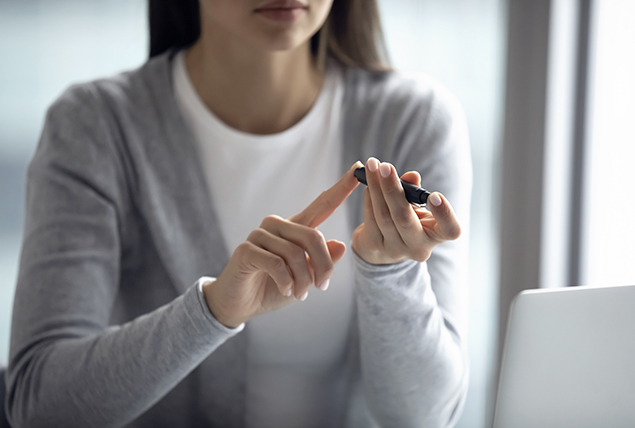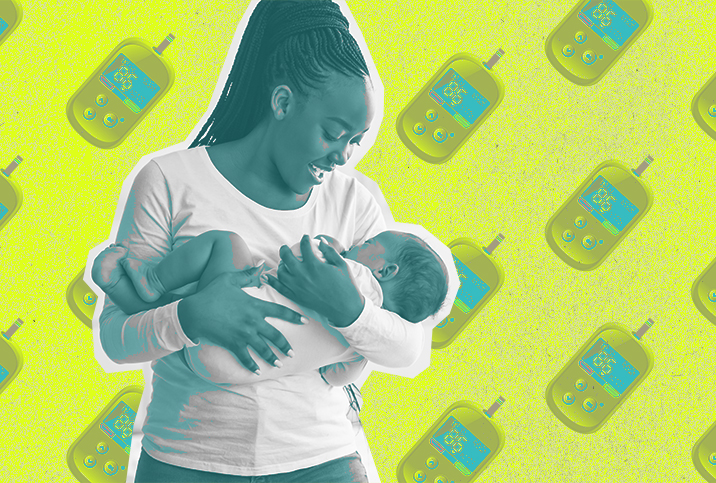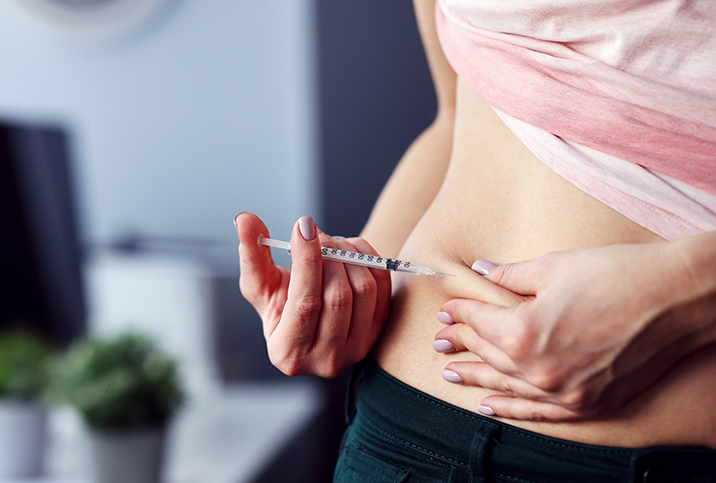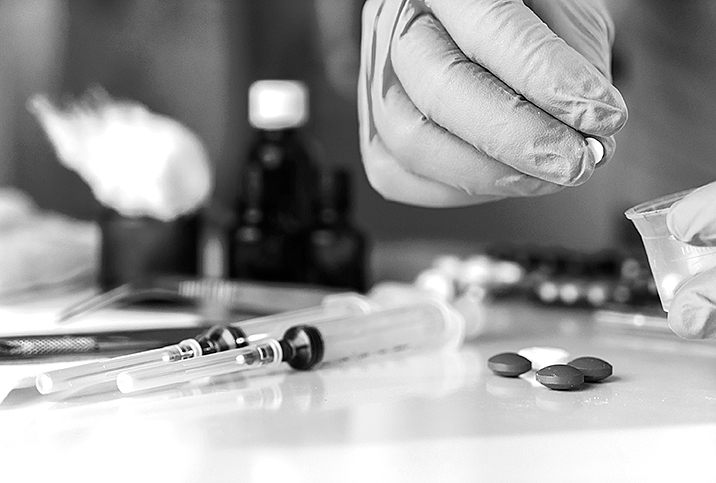These Are the Ways Diabetes Impacts Women's Sexual Health

Sexual health is a multifaceted aspect of overall health—for everyone. Many body parts and systems need to be operating at optimal levels for people to experience a robust sex life.
Diabetes is one condition that disrupts many of the systems responsible for sexual response and impacts women's sexual health. About 15 million women in the United States have diabetes (out of more than 37 million people overall).
Diabetes is a chronic disease that causes sufferers' blood sugar (glucose) to be too high, and the body has a difficult time responding to and correcting it. Provided by the foods we eat, blood glucose is the primary source of energy for the body and brain. Insulin, a hormone made by the pancreas, needs to be absorbed by the cells that then use glucose as energy.
If insulin isn't being adequately produced, or the transfer of glucose from the blood into the cells does not occur, the cells starve for fuel.
Untreated diabetes can result in a wide range of health problems, including nerve damage, kidney disease, heart disease and blindness.
The two most common types of diabetes are type 1 and type 2. Type 1 diabetes is typically diagnosed in children and teens. This disease occurs when the pancreas is unable to produce insulin. Type 2 diabetes typically develops gradually during adulthood. It occurs when the body does not efficiently use the insulin the pancreas produces.
Diabetes can cause sexual complications for men and women. A common issue experienced by people with diabetes is diminished sex drive. Diabetic neuropathy, a type of nerve damage associated with the disease, can lead to sexual dysfunction. This numbness or lack of feeling may occur in the genitals. Neuropathy may also inhibit the ability to orgasm and make it difficult to feel sexual stimulation, which can lead to sex being painful or unenjoyable.
The most common sexual health issue facing men with diabetes is erectile dysfunction (ED), or the persistent inability to achieve and maintain an erection firm enough for sex. In these cases, ED is caused by damage to the nerves and vascular structures that bring blood to the penis.
Women with diabetes may suffer from a lack of vaginal lubrication, pain during sex and the inability to orgasm. Psychological issues are at play, too, as wearing diabetes devices such as insulin pumps may affect a woman's body image and self-esteem. Furthermore, the inconvenience of managing diabetes could impact the spontaneity of sex.
The health of women with diabetes
Diabetes increases the risk of cardiovascular disease by about four times in women (compared with two times in men). Women are also at a higher risk of other diabetes-related complications such as kidney disease, blindness and depression. Hispanic, Black and Native American women are more likely to have diabetes than white women.
Common symptoms of type 1 and type 2 diabetes in women include:
- Extreme fatigue
- Feeling very thirsty
- Urinating more than usual
- Blurry vision
- Feeling very hungry
- Weight loss
- Sores and cuts that don't heal properly
- Dry skin
- Tingling in the feet or hands
Vaginal yeast infections are common among women, but those with diabetes are more susceptible, particularly if their blood sugar levels are high. More than half of all women get a urinary tract infection (UTI) at some point, and having diabetes increases their risk. High blood sugar levels and poor circulation are contributing factors. Furthermore, some women with diabetes can't empty their bladder completely, which provides a breeding ground for bacteria.
Treatment options
The treatment of diabetes is usually multifaceted and includes managing blood sugar levels to control symptoms. Eating healthy and getting regular exercise can help control diabetes, but women with type 1 diabetes also need to take insulin shots.
Type 2 diabetes treatment may include taking oral medication (for example, metformin) to control blood sugar. People with type 2 diabetes make less of their own insulin over time, so they may need to either increase their medications or begin taking insulin shots.
Women with diabetes really need to do anything they can to be as healthy as possible, according to Kelly Casperson, M.D., a urologist at Pacific Northwest Urology Specialists in Bellingham, Washington.
"We know that exercise helps. Getting your insulin resistance optimized can help," she said, adding that diabetes and its connection to women's sexual health is not talked about nearly enough.
"You can do things with diet and exercise and following your doctor's orders to improve your health in most cases," she said. "There's always something we can do. You're your own best advocate to try to be as healthy as you can."
For vaginal dryness, a common sexual symptom of diabetes, women can use over-the-counter nonhormonal moisturizers. That's considered a first-line therapy.
Prescription vaginal estrogen is safe and works very well for vaginal dryness.
"That can be very helpful to prevent pain and improve moisture and blood flow," Casperson said.
Low desire is multifactorial: your relationship, body image, overall health and hormones.
"When a woman comes in with low desire, I really just start with education about desire because a lot of times they'll think it's just one thing or it's just their glucose, but it could be the stresses you have and how well you're sleeping," she said. "Low desire is so many different pieces."
The Food and Drug Administration (FDA) has approved two medications for low desire in women: flibanserin (brand name Addyi) and bremelanotide (Vyleesi).
Casperson never prescribes drugs first because she thinks education can go a long way.
"They're already on medications, and adding medications is never my first thing that I want to do," she said.
Side effects and costs
Each person has a unique response to diabetes medications, and side effects are possible. Your body's chemistry and the type of medication you are taking can influence the negative effects. Metformin is the most common diabetes medication and is largely affordable at about $20 per month on average.
Women on insulin respond differently to it throughout their hormone cycle. Many women have higher glucose and need more insulin approximately one week before their period starts. This varies by woman. If the doctor sees a pattern, they can adjust insulin levels according to a patient's menstrual cycle.
The average list price of one vial of insulin in the United States is $98.70, according to RAND Corp., a public policy think tank. Vaginal estrogen, which is used to treat vaginal dryness, is generic and typically inexpensive. Some online retailers offer it for less than $30, Casperson said.
"I never want somebody to not use vaginal estrogen because of the cost, because there are very inexpensive ways to get it now," she said. "The FDA-approved meds for low desire tend to be more expensive. They won't be covered if you're postmenopausal because they're indicated for premenopausal only. But you can do specialty pharmacies and coupons to try to get the cost down."
Diabetes and sexual health and libido
While there is a plethora of data on how diabetes affects erections in men, studies on women's sexual health are lacking.
"We don't really talk about the effect on women, and the clitoris functions the same way as the penis does," Casperson said. "It needs good blood flow. It needs good nerves. That can all be affected with diabetes."
Diabetes can make women less interested in sex and less able to enjoy it. Vaginal dryness can make sexual activity uncomfortable or even painful for some women. Causes can include hormonal changes, such as those that occur during pregnancy or menopause, restricted blood flow, medicines and nerve injury.
"Decreased desire is more common in women with diabetes," Casperson said, adding that decreased arousal, lubrication and ability to orgasm can also be caused by diabetes. "It's like every avenue of sexual dysfunction can be worse in people with diabetes."
People with diabetes and multiple comorbidities have worse sexual health, she added. Even if diabetes is well-managed, insulin resistance or obesity can play a part. All of it affects body image, which plays a role in sexual health.
Casperson thinks men in general have a little more knowledge of how diabetes can affect their penis.
"I just don't know if women even know that they can have it because women's sexual health is just not talked about as much as men's is at this point," she said. "I think women come in and they don't really associate how their body's functioning plays a part in their sexual health."
Complications and related conditions
Heart disease is the most common diabetes complication, but the disease can cause a variety of other complications and related conditions in women, including:
- Eating disorders. Bulimia and anorexia are more common in women with diabetes than in women without diabetes.
- Skin conditions. Bacterial and fungal infections are common among women with diabetes.
- Nerve damage. This can make it more difficult for the nerves to carry messages from the brain to parts of the body.
- Kidney problems. When kidneys are damaged by high blood sugar levels, they have a more difficult time clearing extra fluid and waste from the body.
- Eye damage. This can lead to vision loss or even blindness.
- Foot damage. Foot problems are serious and can lead to amputation if they are left untreated.
- Depression. Women with diabetes have a greater risk of depression than people without diabetes.
Given that 1 in 9 women is likely to develop diabetes, it's important they understand the sexual health risks that accompany the disease, since it is chronic and not something that will just go away.
Pain during sex and decreased libido are not conducive to a healthy sex life. If these symptoms are affecting you, be sure to talk with your doctor about them.


















